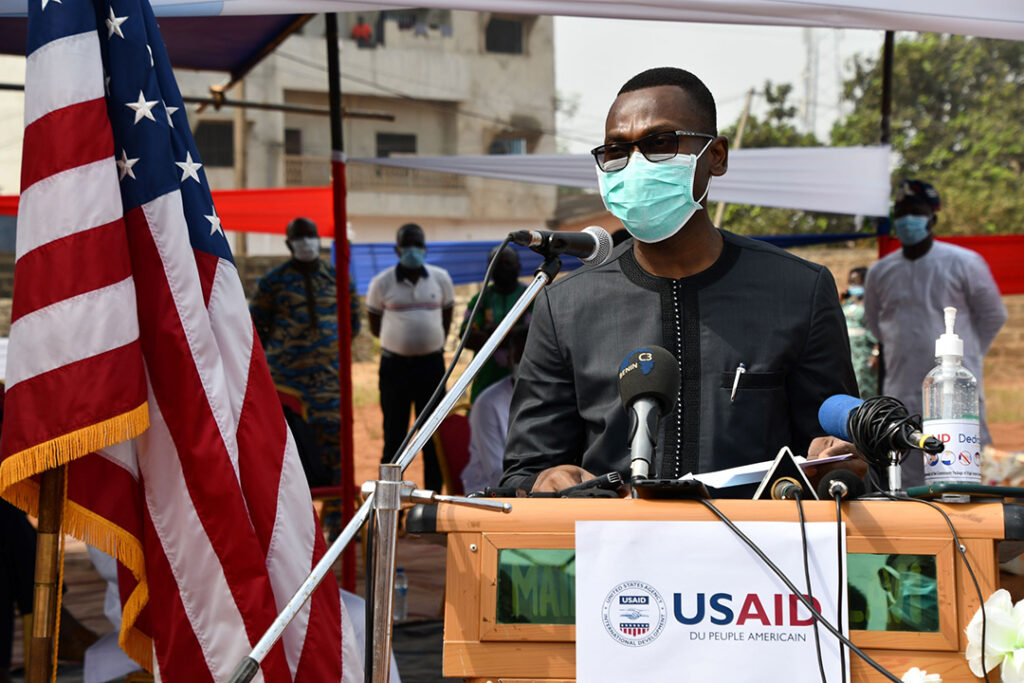ADF STAFF
Like many countries across the globe, Benin is in the midst of a frightening surge of COVID-19 cases as the pandemic’s second wave sweeps the continent.
To bolster the West African nation’s response, the United States recently donated protective equipment and health supplies.
The average number of confirmed cases per day has quadrupled since January 1. Benin had 2,726 cases on November 1, 2020. As of February 28, cases had risen to 5,634, according to Africa Centres for Disease Control and Prevention data.
From January 1 to February 28, the country’s death toll rose from 44 to 70.
“We are currently in the second wave, and the number of cases is increasing,” Minister of Health Benjamin Hounkpatin said in a February 19 statement. “A single patient who dies is one too many losses of life. In recent days, we have recorded several.”
In a ceremony on the same day, Hounkpatin received the U.S. donation from Ambassador Patricia Mahoney.
The U.S. Agency for International Development (USAID) is providing $415,000 in health assistance in the region of Mono and $337,000 in the regions of Atlantique and Collines, as part of its larger package of $4.5 million for the response to COVID-19 throughout Benin.
The objectives of the relief package reach across several of the country’s ministries:
- Delivering 1,323 hand-washing stations to improve hygiene for patients in 105 health facilities and for more than 149,000 students in 297 primary schools and 190 secondary schools.
- Supplying 1,181 community health workers with masks, hand-washing stations, and audio equipment to educate people about COVID-19 and promote protocols such as hand-washing, social distancing and mask-wearing.
- Training and equipping 1,030 volunteer health brigades to monitor cases and compliance with Ministry of Health guidelines.
- Supporting two mobile rapid response teams to assist health facilities with testing, contact tracing and patient case management.
In total, USAID is supplying 69,066 masks, 16,150 liters of soap, 3,205 boxes of gloves, 1,030 megaphones, 53 loudspeakers and other support materials.
“Ending the pandemic depends on our willingness to work together, to practice healthy habits, and to support each other as families, communities and partners,” Mahoney said. “So let’s continue working together to stop this pandemic and to build a brighter and healthier future for all.”
Hounkpatin’s fears of a surge in cases have been realized in the new year.
In October 2020, he went on national television to plead with Beninese to remain vigilant in fighting the disease.
“Some people believe that the virus has already disappeared because the number of fatalities is low,” he said. “That’s a terrible mistake.”
Despite a chronically overburdened health care system, Benin managed to avoid a crisis in 2020 likely because half of its population is below 19 years of age. But with variants spreading, the health minister has seen the numbers take a distressing turn.
“We have young subjects without risk factors who land in the [treatment] center and die there,” he said in his February 19 statement. “Among the latest deaths that we have recorded, there are young people under 40.
“In recent days, everything starts from participating in a party, a ceremony, a funeral, without respect for barrier measures, in particular the wearing of masks — practices which are currently challenged by the government.”

